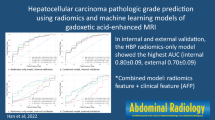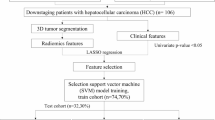Abstract
Purpose
To compare the efficacy of radiomics models via five machine learning algorithms in predicting the histological grade of hepatocellular carcinoma (HCC) before surgery and to develop the most stable model to classify high-risk HCC patients.
Methods
Contrast-enhanced computed tomography (CECT) images of 175 HCC patients before surgery were analysed, and radiomics features were extracted from CECT images (including arterial and portal phases). Five machine learning models, including Bayes, random forest (RF), k-nearest neighbors (KNN), logistic regression (LR), and support vector machine (SVM), were applied to establish the model. The stability of the five models was weighed by the relative standard deviation (RSD), and the lowest RSD value was chosen as the most stable model to predict the histological grade of HCC. The area under the curve (AUC) and Delong tests were devoted to assessing the predictive efficacy of the models.
Results
High-grade HCC accounted for 28.57% (50/175) of the 175 patients. The RSD value of AUC via the RF machine learning model was the lowest (2.3%), followed by Bayes (3.2%), KNN (6.4%), SVM (8.7%) and LR (31.3%). In addition, the RF model (AUC = 0.995) was better than the other four models in the training set (p < 0.05), as well as obtained good predictive performance in the test set (AUC = 0.837).
Conclusion
Among the five machine learning models, the RF-based radiomics model was the most stable and performed excellently in identifying high histological grade of HCC.







Similar content being viewed by others
References
Aerts HJ, Velazquez ER, Leijenaar RT et al (2014) Decoding tumour phenotype by noninvasive imaging using a quantitative radiomics approach. Nat Commun 5:4006. https://doi.org/10.1038/ncomms5006
Amin MB, Greene FL, Edge SB et al. (2017) The Eighth Edition AJCC Cancer Staging Manual: Continuing to build a bridge from a population-based to a more “personalized” approach to cancer staging. CA Cancer J Clin, 67: 93–99. https://doi.org/10.3322/caac.21388
Bektas CT, Kocak B, Yardimci AH et al (2019) Clear cell renal cell carcinoma: machine learning-based quantitative computed tomography texture analysis for prediction of Fuhrman nuclear grade. Eur Radiol 29:1153–1163. https://doi.org/10.1007/s00330-018-5698-2
Bray F, Ferlay J, Soerjomataram I, Siegel RL, Torre LA, Jemal A (2018) Global cancer statistics 2018: GLOBOCAN estimates of incidence and mortality worldwide for 36 cancers in 185 countries. CA Cancer J Clin 68:394–424. https://doi.org/10.3322/caac.21492
Chen W, Zhang T, Xu L et al (2021) Radiomics analysis of contrast-enhanced CT for hepatocellular carcinoma grading. Front Oncol 11:660509. https://doi.org/10.3389/fonc.2021.660509
Coroller TP, Grossmann P, Hou Y et al (2015) CT-based radiomic signature predicts distant metastasis in lung adenocarcinoma. Radiother Oncol 114:345–350. https://doi.org/10.1016/j.radonc.2015.02.015
Edmondson HA, Steiner PE (1954) Primary carcinoma of the liver: a study of 100 cases among 48,900 necropsies. Cancer 7:462–503
Forner A, Reig M, Bruix J (2018) Hepatocellular carcinoma. Lancet 391:1301–1314. https://doi.org/10.1016/S0140-6736(18)30010-2
Ganeshan B, Goh V, Mandeville HC, Ng QS, Hoskin PJ, Miles KA (2013) Non-small cell lung cancer: histopathologic correlates for texture parameters at CT. Radiology 266:326–336. https://doi.org/10.1148/radiol.12112428
Gillies RJ, Kinahan PE, Hricak H (2016) Radiomics: images are more than pictures, they are data. Radiology 278:563–577. https://doi.org/10.1148/radiol.2015151169
Huang YQ, Liang CH, He L et al (2016) Development and validation of a radiomics nomogram for preoperative prediction of lymph node metastasis in colorectal cancer. J Clin Oncol 34:2157–2164. https://doi.org/10.1200/JCO.2015.65.9128
Jonas S, Bechstein WO, Steinmuller T et al (2001) Vascular invasion and histopathologic grading determine outcome after liver transplantation for hepatocellular carcinoma in cirrhosis. Hepatology 33:1080–1086. https://doi.org/10.1053/jhep.2001.23561
Kocak B, Durmaz ES, Ates E, Kilickesmez O (2019) Radiomics with artificial intelligence: a practical guide for beginners. Diagn Interv Radiol 25:485–495. https://doi.org/10.5152/dir.2019.19321
Koo TK, Li MY (2016) A guideline of selecting and reporting intraclass correlation coefficients for reliability research. J Chiropr Med 15:155–163. https://doi.org/10.1016/j.jcm.2016.02.012
Lambin P, Rios-Velazquez E, Leijenaar R et al (2012) Radiomics: extracting more information from medical images using advanced feature analysis. Eur J Cancer 48:441–446. https://doi.org/10.1016/j.ejca.2011.11.036
Lambin P, Leijenaar RTH, Deist TM et al (2017) Radiomics: the bridge between medical imaging and personalized medicine. Nat Rev Clin Oncol 14:749–762. https://doi.org/10.1038/nrclinonc.2017.141
Lauwers GY, Terris B, Balis UJ et al (2002) Prognostic histologic indicators of curatively resected hepatocellular carcinomas: a multi-institutional analysis of 425 patients with definition of a histologic prognostic index. Am J Surg Pathol 26:25–34. https://doi.org/10.1097/00000478-200201000-00003
Li H, Zhu Y, Burnside ES et al (2016) MR imaging radiomics signatures for predicting the risk of breast cancer recurrence as given by research versions of mammaprint, oncotype DX, and PAM50 gene assays. Radiology 281:382–391. https://doi.org/10.1148/radiol.2016152110
Liu S, Liu S, Ji C et al (2017) Application of CT texture analysis in predicting histopathological characteristics of gastric cancers. Eur Radiol 27:4951–4959. https://doi.org/10.1007/s00330-017-4881-1
Llovet JM, Zucman-Rossi J, Pikarsky E et al (2016) Hepatocellular carcinoma. Nat Rev Dis Primers 2:16018. https://doi.org/10.1038/nrdp.2016.18
Mao B, Zhang L, Ning P et al (2020) Preoperative prediction for pathological grade of hepatocellular carcinoma via machine learning-based radiomics. Eur Radiol 30:6924–6932. https://doi.org/10.1007/s00330-020-07056-5
Mao Y, Wang J, Zhu Y et al (2022) Gd-EOB-DTPA-enhanced MRI radiomic features for predicting histological grade of hepatocellular carcinoma. Hepatobiliary Surg Nutr 11:13–24. https://doi.org/10.21037/hbsn-19-870
Martins-Filho SN, Paiva C, Azevedo RS, Alves VAF (2017) Histological grading of hepatocellular carcinoma-a systematic review of literature. Front Med (lausanne) 4:193. https://doi.org/10.3389/fmed.2017.00193
Marusyk A, Almendro V, Polyak K (2012) Intra-tumour heterogeneity: a looking glass for cancer? Nat Rev Cancer 12:323–334. https://doi.org/10.1038/nrc3261
Ng IO, Lai EC, Fan ST, Ng MM, So MK (1995) Prognostic significance of pathologic features of hepatocellular carcinoma. A multivariate analysis of 278 patients. Cancer 76:2443–2448
Njei B, Rotman Y, Ditah I, Lim JK (2015) Emerging trends in hepatocellular carcinoma incidence and mortality. Hepatology 61:191–199. https://doi.org/10.1002/hep.27388
Okusaka T, Okada S, Ueno H et al (2002) Satellite lesions in patients with small hepatocellular carcinoma with reference to clinicopathologic features. Cancer 95:1931–1937. https://doi.org/10.1002/cncr.10892
Sasaki A, Kai S, Iwashita Y, Hirano S, Ohta M, Kitano S (2005) Microsatellite distribution and indication for locoregional therapy in small hepatocellular carcinoma. Cancer 103:299–306. https://doi.org/10.1002/cncr.20798
Shu Z, Mao D, Song Q, Xu Y, Pang P, Zhang Y (2022) Multiparameter MRI-based radiomics for preoperative prediction of extramural venous invasion in rectal cancer. Eur Radiol 32:1002–1013. https://doi.org/10.1007/s00330-021-08242-9
Tabrizian P, Jibara G, Shrager B, Schwartz M, Roayaie S (2015) Recurrence of hepatocellular cancer after resection: patterns, treatments, and prognosis. Ann Surg 261:947–955. https://doi.org/10.1097/SLA.0000000000000710
van Griethuysen JJM, Fedorov A, Parmar C et al (2017) Computational radiomics system to decode the radiographic phenotype. Cancer Res 77:e104–e107. https://doi.org/10.1158/0008-5472.CAN-17-0339
Wu M, Tan H, Gao F et al (2019) Predicting the grade of hepatocellular carcinoma based on non-contrast-enhanced MRI radiomics signature. Eur Radiol 29:2802–2811. https://doi.org/10.1007/s00330-018-5787-2
Zhang B, He X, Ouyang F et al (2017) Radiomic machine-learning classifiers for prognostic biomarkers of advanced nasopharyngeal carcinoma. Cancer Lett 403:21–27. https://doi.org/10.1016/j.canlet.2017.06.004
Zhou W, Zhang L, Wang K et al (2017) Malignancy characterization of hepatocellular carcinomas based on texture analysis of contrast-enhanced MR images. J Magn Reson Imaging 45:1476–1484. https://doi.org/10.1002/jmri.25454
Zwanenburg A, Vallieres M, Abdalah MA et al (2020) The image biomarker standardization initiative: standardized quantitative radiomics for high-throughput image-based phenotyping. Radiology 295:328–338. https://doi.org/10.1148/radiol.2020191145
Funding
This research was supported by the Zhejiang Provincial Natural Science Foundation of China (Grant NO. LTGY23H180018), and the Medical Science and Technology Project of Zhejiang Province (Grant NOs. 2020KY019, 2021PY036, 2023KY485).
Author information
Authors and Affiliations
Contributions
CW and XD analyzed data, selected study, wrote the preliminary draft, reviewed of final draft. YZ collected data and conducted radiomics analysis. LZ, YC and YW performed study selection and statistical analysis. YL and JC proposed the concept and design of the study. All authors contributed to the article and approved the final version of the manuscript for submission.
Corresponding author
Ethics declarations
Conflict of interest
The authors of this manuscript declare no confict of interest.
Ethical approval
This study was approved by Medical Ethics Committee of Zhejiang Provincial People’s Hospital, and informed content was waived.
Additional information
Publisher's Note
Springer Nature remains neutral with regard to jurisdictional claims in published maps and institutional affiliations.
Supplementary Information
Below is the link to the electronic supplementary material.
Rights and permissions
Springer Nature or its licensor (e.g. a society or other partner) holds exclusive rights to this article under a publishing agreement with the author(s) or other rightsholder(s); author self-archiving of the accepted manuscript version of this article is solely governed by the terms of such publishing agreement and applicable law.
About this article
Cite this article
Wu, C., Du, X., Zhang, Y. et al. Five machine learning-based radiomics models for preoperative prediction of histological grade in hepatocellular carcinoma. J Cancer Res Clin Oncol 149, 15103–15112 (2023). https://doi.org/10.1007/s00432-023-05327-4
Received:
Accepted:
Published:
Issue Date:
DOI: https://doi.org/10.1007/s00432-023-05327-4




